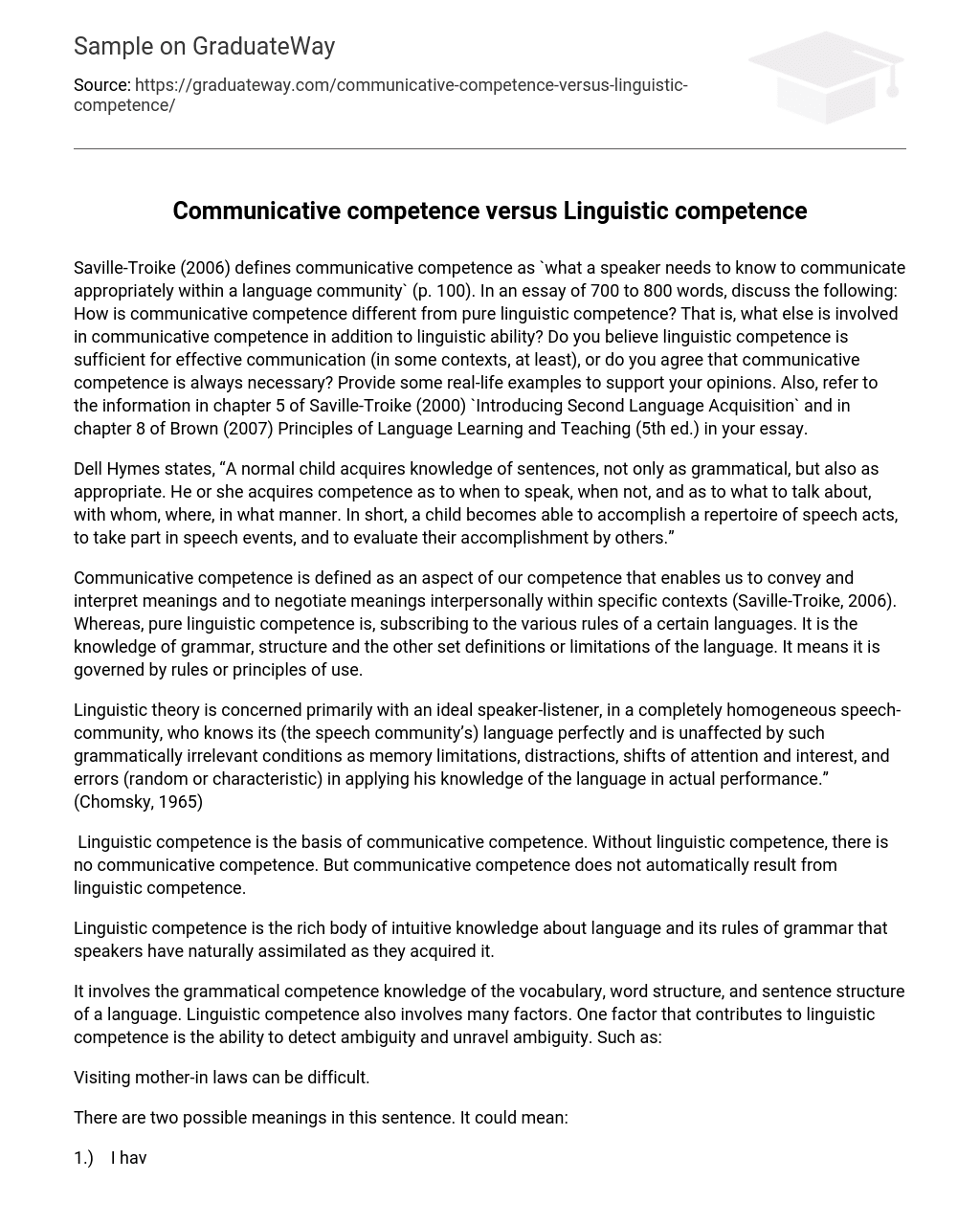Saville-Troike (2006) defines communicative competence as what a speaker needs to know to communicate appropriately within a language community” (p. 100). In an essay of 700 to 800 words, discuss the following:
- How is communicative competence different from pure linguistic competence?
- What else is involved in communicative competence in addition to linguistic ability?
- Do you believe linguistic competence is sufficient for effective communication (in some contexts, at least), or do you agree that communicative competence is always necessary?
Please provide some real-life examples to support your opinions. Also, refer to the information in chapter 5 of Saville-Troike’s (2000) “Introducing Second Language Acquisition” and chapter 8 of Brown’s (2007) “Principles of Language Learning and Teaching” (5th ed.) in your essay.
Dell Hymes states, A normal child acquires knowledge of sentences not only as grammatical but also as appropriate. He or she acquires competence in knowing when to speak, when not to speak, what to talk about, with whom to talk about it, where to talk about it and in what manner. In short, a child becomes capable of performing a range of speech acts and participating in speech events while also being able to evaluate their performance by others.
Communicative competence refers to our ability to convey and interpret meanings, as well as negotiate meanings in specific contexts with others (Saville-Troike, 2006). On the other hand, pure linguistic competence involves following the rules of a particular language. This includes knowledge of grammar, structure and other defined limitations of the language. Pure linguistic competence is governed by principles or rules of use.
Linguistic theory is primarily concerned with an ideal speaker-listener who belongs to a completely homogeneous speech-community, knows its language perfectly, and is unaffected by grammatically irrelevant conditions such as memory limitations, distractions, shifts of attention and interest, or errors – whether random or characteristic – while applying their knowledge of the language in actual performance.” (Chomsky, 1965)
Linguistic competence is the foundation of communicative competence. Without linguistic competence, communicative competence cannot exist. However, having linguistic competence does not guarantee communicative competence.
Linguistic competence refers to the extensive knowledge that speakers have naturally assimilated about language and its rules of grammar as they acquired it intuitively.
Linguistic competence involves knowledge of the vocabulary, word structure, and sentence structure of a language. It also encompasses the ability to detect and unravel ambiguity, which is a crucial factor in linguistic competence.
Visiting mother-in-laws can be difficult.
There are two possible meanings for this sentence. It could mean:
1. I have to visit my mother-in-law, which can be difficult.
Or
2) My mother-in-law is visiting us, and she can be difficult.
Another factor to consider is the ability to perceive relationships, both structural and semantic, among elements that may not be immediately apparent.
Anna is hard to please, meaning that it takes a lot to make her happy.
We must remember that the actual usage of rules in concrete situations differs from person to person and situation to situation.
Communicative competence is the socially appropriate use of language, resulting from a gathering of experience, knowledge, appropriateness of the situation or circumstance, and sensitivity. According to Paulston (1992), it extends to both knowledge and expectation of who may or may not speak in certain settings, when to speak and when to remain silent, whom one may speak to, how one may speak to persons of different statuses and roles, what appropriate nonverbal behaviors are in various contexts, what the routines for turn-taking are in conversation. It also includes knowing how to ask for and give information, how to request assistance or cooperation politely or decline them gracefully. Furthermore, communicative competence involves knowing how to give commands effectively while enforcing discipline appropriately. In short; it encompasses everything involving the use of language and other communication dimensions in particular social settings (Saville-Troike 1989).
To effectively communicate, we need to assimilate the language’s culture. This includes the language itself, the situation, commonly used expressions, and whether it is appropriate to use certain words or phrases. Sensitivity is a crucial aspect of communicative competence because it requires prudence in deciding what to say or not say in a given circumstance. Competent communication relies on various factors that are difficult to explain precisely but involve innate logic and reasoning on the speaker’s part.
Communicative competence is essential in language speaking because it ensures that the correct and accurate message is conveyed without any unintended meanings. Mere linguistic ability cannot guarantee that the speaker’s intention will be understood if it is not said in the appropriate context or if the language is interpreted differently than intended.
Accurate grammar and appropriate usage are necessary to effectively communicate a message. Communication is a combination of purposeful acts and elements (Saville-Troike, 1989). Therefore, it is crucial to use correct grammar and social norms to convey one’s intended message.
To be competent in communication, one must not only have perfect grammar and translation skills when speaking a language, but also understand its rules of grammar and usage. Communicative competence encompasses both linguistic competence and performance. Without the fusion of these two factors, complete knowledge cannot be achieved.





